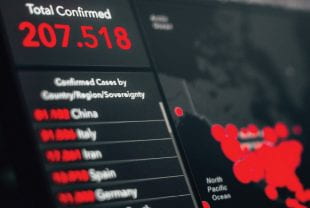Baker Institute health care experts: US must mandate uniform case reporting for life-threatening pandemics
Jeff Falk
713-348-6775
jfalk@rice.edu
Baker Institute health care experts: US must mandate uniform case reporting for life-threatening pandemics
HOUSTON — (Feb. 1, 2021) –The Centers for Disease Control and Prevention has received limited data on the spread of COVID-19 in the U.S. despite providing detailed case report forms, according to a new research paper from Rice University’s Baker Institute for Public Policy.
 The paper’s authors recommend mandating uniform case reporting for life-threatening pandemics.
The paper’s authors recommend mandating uniform case reporting for life-threatening pandemics.
“CDC Case Report Data for COVID-19: Characterizing the Pandemic with Limited Information” was co-authored by Vivian Ho, the chair in health economics at the Baker Institute and a professor of economics at Rice; Marah Short, associate director of the institute’s Center for Health and Biosciences; and Sasa Tapaneeyakul, a research programmer at the center.
“Nationwide standardized surveillance of COVID-19 using the CDC’s COVID-19 case report forms could yield invaluable information on disease burden and the nature of virus transmission,” Ho said. “If respondents provided comprehensive responses to the form’s queries, public health officials, policymakers and business leaders would have a wealth of data when making critical decisions on where to direct testing and treatment resources, and how to conduct safe reopenings.”
The researchers obtained CDC case reports with an expedited Freedom of Information Act request (with pro bono legal assistance from the Baker Botts law firm). They examined data for May 5 through July 19, the latest date for which they received case reports. The researchers assessed the completeness of the CDC case counts by comparing them to more accurate counts reported by the New York Times. For example, the CDC’s COVID-19 case count for Texas was only 5.5% of what the New York Times reported during the study period.
“We found that the CDC’s case reports contained surprisingly incomplete information relative to the amount that the agency’s official form was intended to collect,” Short said. Only seven states had sufficient data to characterize cases by ethnicity or race, or exposure type, the researchers found. In many states, there was absolutely no information reported on the source of exposure to the virus.
People from 20 to 39 years of age accounted for more COVID-19 cases than their share of the population, the researchers found. The most infections for all ages tended to occur in the last third of their sample, from June 24 through July 19. Whites were infected in proportion to their share of the population, while Hispanic cases were overrepresented. The most common places of exposure were at work and home.
With better reporting researchers would have had, for example, comprehensive data on how many people with COVID-19 were exposed to an airport or and airplane before they tested positive.
“With this data, we would be able to quantify how safe it is to fly, and we could even compare risks in different airports across the country,” said Ho, who is also director of the Baker Institute’s Center for Health and Biosciences and a professor at Baylor College of Medicine. “We would be able to understand what workplace settings people were exposed in, so that employers and workers would understand the relative risks of working in factories, warehouses, restaurants and bars, or grocery stores. Policymakers could use this information to implement targeted shutdowns, which would be less damaging to business owners than comprehensive lockdowns.”
Scientists believe it is only a matter of time before another pandemic threatens global health, the authors noted.
“Policymakers should support public health experts in bolstering the data collection and reporting of infectious diseases in the U.S., so that the country is better able to respond to the next disease outbreak when it occurs,” Short said. “A well-informed, rapid, comprehensive response to disease outbreaks reduces disease spread, which preserves the most opportunities for safe economic activity. Investing in nationwide, uniform, mandatory case reporting would likely yield economic returns that are orders of magnitude larger than the costs.”
-30-
To schedule an interview with one of the authors, contact Jeff Falk, director of national media relations at Rice, at jfalk@rice.edu or 713-348-6775.
Related materials:
Paper: www.bakerinstitute.org/media/files/files/04a10cf6/chb-pub-cdc-covid19-013121.pdf
Ho bio: www.bakerinstitute.org/experts/vivian-ho
Short bio: www.bakerinstitute.org/experts/marah-short
Tapaneeyakul: www.bakerinstitute.org/experts/sasathorn-tapaneeyakul
Follow the Baker Institute via Twitter @BakerInstitute.
Follow the Baker Institute’s Center for Health and Biosciences via Twitter @BakerCHB.
Follow Rice News and Media Relations via Twitter @RiceUNews.
Founded in 1993, Rice University’s Baker Institute ranks as the No. 1 university-affiliated think tank in the world and the No. 1 energy think tank in the world. As a premier nonpartisan think tank, the institute conducts research on domestic and foreign policy issues with the goal of bridging the gap between the theory and practice of public policy. The institute’s strong track record of achievement reflects the work of its endowed fellows, Rice University faculty scholars and staff, coupled with its outreach to the Rice student body through fellow-taught classes — including a public policy course — and student leadership and internship programs. Learn more about the institute at www.bakerinstitute.org or on the institute’s blog, http://blog.bakerinstitute.org.








 User Center
User Center My Training Class
My Training Class Feedback
Feedback












Comments
Something to say?
Log in or Sign up for free